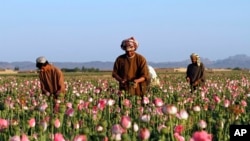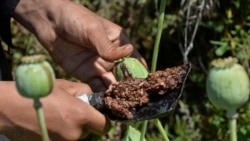Farmers in Afghanistan say that they will continue to grow poppy amid uncertainty over the Taliban’s poppy eradication policy.
"We have no choice but to cultivate opium poppy," said Noor, 52, a farmer living in a remote village in the western Farah province. For safety reasons, he did not want his full name revealed.
A father of 10 children, Noor said his family will go hungry without the opium poppy crop.
"I am not sure how I will be able to provide food to my children until the harvest. We do not have food for a month, even. The prices have skyrocketed, and people cannot afford buying food," he said.
A report released in October by the United Nations’ Food and Agriculture Organization warned that the number of people facing acute food insecurity in Afghanistan will increase to 22.8 million, 55% of the population by March 2022 when compared to 18.8 million from September to October 2021.
Afghanistan is turning into "the world’s largest humanitarian crisis," according to a World Food Program report stating, "continuing drought, escalating displacement, the collapse of public service, and a deepening economic crisis have driven the entire country to the precipice."
Noor, who has been growing opium poppy for several years now, said that wheat, the main crop grown in the province, is less profitable and not as easy to grow as poppy.
"Poppy takes only six months and it needs less water, as we are experiencing a drought. And there is not much money in growing wheat," he said.
An added incentive to growing poppy this year was the spike in opium prices in August after the Taliban took power in the country.
A report by the U.N. Office on Drugs and Crimes (UNODC) released last month said "prices doubled from May 2021 levels — as an immediate reaction to the changed political situation. This may have been an indication of uncertainty over the future of the market rather than a shortage of opium."
Afghanistan is the largest producer of opium in the world. In 2020, about 85% of opium production worldwide was grown in the country, UNODC reported last month.
Opiates in Afghanistan generated some $1.8 to $2.7 billion in income, which is 6% to 11% of the GDP, in 2021.
Taliban stance
In his first press conference in August, Taliban spokesman Zabiullah Mujahid vowed that the group will curb opium poppy cultivation and trafficking.
"We fully assure our compatriots and the world that Afghanistan will no longer be the center of opium and poppy (production)," he said, and asked for help globally to provide other sources of income for the farmers.
The U.N.’s FAO is supporting wheat farming and is "distributing wheat cultivation packages for Afghanistan’s winter wheat season across 31 out of 34," and is calling on "greater and immediate support for agriculture production."
Sayed Ali, 64, a farmer in the Chaparhar district of the eastern Nangarhar province, said opium poppy fields yield five to six times more than wheat or corn.
"Even in the areas where opium poppy was not grown in the last 20 years, farmers have grown poppy this year. This is the source for our livelihood. There is no market for other products,” Ali said.
In an interview last month, Mujahid said, however, that Afghans are facing "an economic crisis, and stopping people from their only means of income is not a good idea."
The Taliban banned poppy cultivation in the 2000-2001 growing season. They were then ousted by the U.S. and its allies in late 2001. But they benefited from poppy cultivation and the opium trade in the last 20 years, as it was one of the main sources of funding the insurgency.
According to a June 2021 U.N. report, opium poppy cultivation and trade was one of “the most significant sources of income” for the Taliban. In 2020, the Taliban earned an estimated $460 million from the opium poppy cultivation and trade.
Noor said the Taliban not only benefited from the opium cultivation but forced farmers to pay taxes.
"They come during nesh (time of collecting the opium gum) in early April and collect taxes. They take one seer (100 grams) of opium per laborer (who collects opium). And on the top of that, they take 3 kilograms per 4-inch well and 1.2 kilograms of opium per 2-inch well," said Noor. "They will beat us, throw us in the car, and take us to the jail if we do not pay them."
He added, "Right now, they do not tell us anything about eradication."
Possible backlash
Ali said some residents in the district have been cultivating poppy since the early 1970s.
He recalled the Taliban’s ban on poppy cultivation in 2000.
"I and other farmers stored opium and sold our opium gradually to buy food," he said. “The Taliban might be able to impose a ban on poppy cultivation this time, but people will starve, and it is possible that there could be a backlash.”
Khan, 35, a retail shopkeeper in Musa Kala in the southern Helmand province, who goes by his first name only, told VOA his livelihood depends on opium.
"It will definitely have an impact on my life. If there is no opium, the economy will weaken and my shopkeeping will halt," said Khan, a father of five children. "I will have to migrate to somewhere else if opium poppy is banned."
International response
"I think there has been too much attention to eradicating farmers’ poppy fields, which actually is the least criminal element of it," said William Byrd, senior Afghanistan expert at the U.S. Institute of Peace.
In a report in August, the U.S. Special Inspector General for Afghanistan Reconstruction (SIGAR) said that since 2002, the U.S. has spent about $9 billion in counternarcotics efforts in Afghanistan, however, the cultivation of opium poppy has increased in the country.
The trading side of the opium is where the money is generated, said Byrd, adding that regional level policy is needed to target drug traffickers. The regional countries "are very shy about going after them," Byrd said.
He said that tracking down and confiscating the drug money that goes into banks in the region should be another area of focus, and added that any solution to fight the war on drugs in Afghanistan needs to be "gradual and sustainable."






